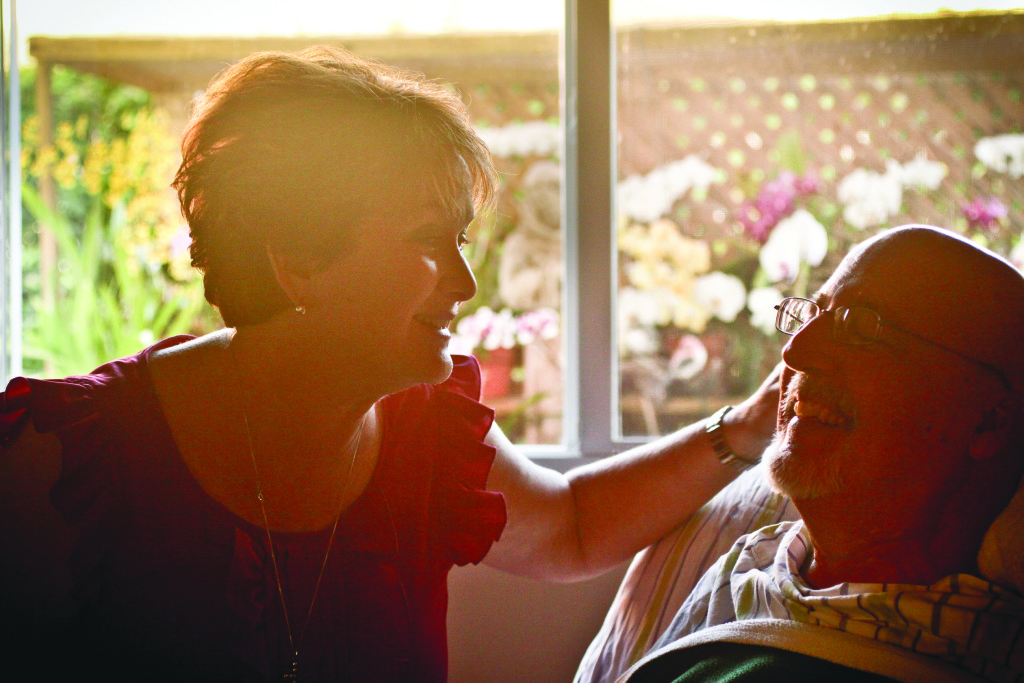Staying Strong

Lift Off: Muñoz’s routine of getting into bed consists of being fitted with a set of support straps his care giver places on him. He is then raised by a Hoyer lift 5 feet in the air that gently places him down removing strain from his limbs. Muñoz considers the routine activity as a highlight of his day.
Five year’s ago doctors told Germán Muñoz he was supposed to be dead by now. But Muñoz, who has Lou Gehrig’s Disease, is far from it.
“Most people die within three years. I’ve been alive for five [years] and three months,” Muñoz said. “I know there’s a purpose. As I get weaker my faith gets stronger.”
Diagnosed in 2006, the disease has robbed Muñoz of most of his movement. The condition, a terminal illness of the nerve cells that controls voluntary muscle movement, has left Muñoz, the chairperson of the department of social sciences at Wolfson Campus, immobile.
He can’t move his torso or limbs. His biggest fear is that he will lose his voice and suffocate to death.
The only thing he can control are his head and neck. But his smile is forever moving.
“I’m blessed I can still chew my food. I can blink and breathe. I can watch TV, see my family,” Muñoz said. “I can’t move but I can feel.”
Muñoz first felt something was wrong in 2005. He started losing his breath easily. And once, when he tried to open a plastic water bottle he was unable to. When a co-worker opened it with ease, he knew something wasn’t right.
“I knew what I had. I would Google my symptoms and everything pointed to [Lou Gehrig’s Disease],” Muñoz said. “However, I ignored it.”
Eventually, the signs became overwhelming. His right leg became gimpy, and he lost control of his right and left arms as well as his left leg. By 2008 he could no longer walk.
His wife of 38 years, Piedad Muñoz, massages his arms and legs at night to improve circulation.
“My wife cries for me,” Muñoz said. “I haven’t shed a tear.”
Piedad said her husband’s illness has made major changes in their lifestyle. Muñoz can no longer travel to places he enjoyed visiting like Europe, South America and Africa.
“I have to know that if his nose itches, I have to scratch it,” Piedad said. “But when I said I was in love with him, there was no going back. If I were to do it all over again, I would.”
Thirty one-year-old Jose Miguel Fonseca is Muñoz’s caregiver six days a week. He logs more than 60 hours on the job.
Fonseca’s responsibilities include bathing, dressing and feeding Muñoz. He is also responsible for brushing his teeth, giving him air using a breathing apparatus, and takes him to the restroom.
“I know every crevice of his heart,” Fonseca said. “Over the past two years he’s taught me humility and true faith, you know the type that shines no matter what bad thing happens to you.”
A typical day for Muñoz consists of returning from work around 4 p.m. and going to bed at eight.
To get into bed he uses a hoyer lift sling that is controlled by his caregiver. The machine lifts Muñoz about five feet in the air before placing him on his bed.
In Dec. 2010 Muñoz purchased an electric wheelchair. It is his third chair, the previous ones have been manual.
“Being in a wheelchair is a piece of cake,” he said. “Its bothering people I can’t stand.” Despite the circumstances, Muñoz rejoices.
“Every time my grandson comes over he just loves to press the button,” Muñoz said. “I can’t be thinking about my arms and legs, my grandson is laughing with me.”
Before his diagnosis, Muñoz, a 1968 graduate of Belen Jesuit Preparatory School, enjoyed playing basketball every Tuesday at his alma mater. He also volunteered at several places, coaching football and baseball.
“What I miss most is being active in the office. I used to challenge my students with who can do more push-ups,” Muñoz said. “I always did about 45 non-stop. It was my way of encouraging my students to stay in shape.”
Muñoz was born in Santiago de Cuba. He arrived in the United States in 1962, just one year after the Bay of Pigs invasion.
“Because we had nothing and my mom couldn’t afford me, she gave me to an orphanage, I was eleven.” Muñoz said. “So to stay away from the delinquents, I would play sports. Lots of them”
Muñoz is scheduled to retire from MDC on Aug. 31.
“Going to work is what keeps me alive,”Muñoz said. “For some its poison, for me its a joy.”
Piedad fears Muñoz’s absence from the workplace will send him spiraling into depression.
However, Muñoz says he has plans.
“I want to go to church daily,” Muñoz said. “I want to go to hospitals, and if I still have a voice, visit people and make them feel better.”
But Muñoz also knows that things can get worse. He is afraid of losing his voice, so he is working on a list of things he needs, so his wife can help him if he loses his ability to verbally communicate.
“Whatever is gone, is gone,” Muñoz said. “Whatever is gonna happen, hasn’t happened yet.”

